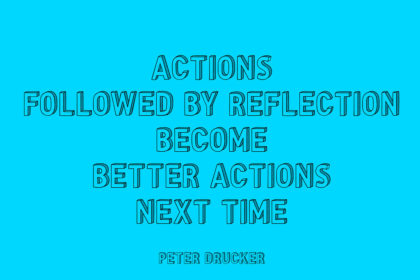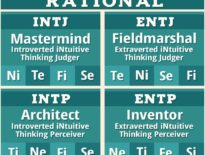
- The best way to predict the future is to create it.
- Management is doing things right; leadership is doing the right things.
- There is nothing so useless as doing efficiently that which should not be done at all.
- The most important thing in communication is to hear what isn’t being said.
- Knowledge has to be improved, challenged, and increased constantly, or it vanishes.
- Whenever you see a successful business, someone once made a courageous decision.
- The aim of marketing is to know and understand the customer so well the product or service fits him and sells itself.
- Effective leadership is not about making speeches or being liked; leadership is defined by results not attributes.
- The purpose of a business is to create a customer.
- Plans are only good intentions unless they immediately degenerate into hard work.
- Because the purpose of business is to create a customer, the business enterprise has two – and only two – basic functions: marketing and innovation. Marketing and innovation produce results; all the rest are costs. Marketing is the distinguishing, unique function of the business.
I’m an amateur economist and a professional marketer. And there is something I truly appreciate about what both in fact are: Sciences.
Science establishes the notion that a “theory” is in fact considered definitive, until proven otherwise.
That is distinct from a “law,” which is considered proven conclusively.
Drucker, as an economist, established a great many theories of markets, management, and organizations.
Facts, until proven otherwise.
Today, in my experience, many challenge or question those theories and I think we can appreciate WHY so many question Drucker’s wisdom because the way we work, roles and responsibilities, and technologies involved in business, have changed how many perceive how things work.
That isn’t evidence concluding Drucker’s theories are wrong; that’s mis-perception of what Drucker established.
To appreciate my point, let’s explore an actual scientific theory and how perceptions change: The Big Bang Theory.
Referred to as a theory not because it’s an idea, but rather because it can’t be proven conclusively. It’s not a “law” but it is considered the fact, the answer, as nothing refutes that it is in fact what happened.
As humans, our perceptions change, don’t they?
The Big Bang Theory established an origin of the universe and for a time, was vehemently argued against by religion. As our perceptions evolved, many religions came to embrace the theory (interesting fact, the theory was proposed by a Catholic Priest!), citing that even if true, it doesn’t refute a creator because *something* had to go bang… “therefore there still must be a God.”
Now, I don’t mean to spark a religious debate nor discussion. My point is only to elucidate how the foundational theory remains considered fact, no matter how people interpret what it means over time.
Peoples’ perceptions changed and our application of the theory was questioned; but in reality, the fact of the theory is exactly the same as it ever was.
In this case, people adapted to embrace it… but the theory remains the same regardless.
Back to Drucker’s case
The best example of where this question is pertinent is in how the opposite has been happening; perceptions changing, causing us to doubt, rather than accept (but nuance), the theory.
In the most obvious case, his theories of Marketing.
In recent years, (no)thanks to the internet, our perception of Marketing has changed. Roles have changed in organizations.
In Drucker’s time, the CMO was paramount in the Company. It’s from this era that we have the 4Ps, for example: promotion, place, price, and product. Marketing, evident in his ideas above, is the distinguishing and unique function of a business.
The internet changed things. Drastically.
I’m a literal example of that.
Having started my career, online, in the late nineties, I was one of the earliest to apply my traditional Marketing education, directly in the dawn of the internet (at Yahoo).
Imagine that time…
“Marketers” did focus groups and and surveys, something people like me we’re experiencing being done in a fraction of the time and with sample sizes far more substantial. Analytics.
“Marketers” ran advertising on radio, television, and in magazines, something we’re still doing of course, but along came *us* and we were able to run ads FAR more efficiently and measurably online.
“Marketers” didn’t write software! That was the work of engineers and developers. But with the internet, websites, and SaaS, suddenly we, anyone really, could build the websites and more.
And what happened?
Older marketers, the VPs and CMOs in most cases, had no idea what *we* were doing.
I recall being a 22 year old kid (my word, I don’t mean it antagonistically of age), and being called into Board meetings by people twice my age and more, to explain to the CxOs and investors, things they just couldn’t grasp. And things with which the CMOs couldn’t even help clarify: search engines, social media, behavioral targeting, multivariate testing, and more. All of this was new.
How on Earth was this *kid* driving business results so much more substantially than these wizened marketers?!
Screw it, let’s shift hundreds of millions of dollars of our budget to this Google thing and whatever else he wants.
In the span of a decade, those young people and the internet, practically single handedly destroyed the Ad Agency, traditional Marketing, News Media and PR, Advertising, and more.
And those who had been the keepers of that trusted and pivotal Marketing theory (MBA students, Executives, and Marketing Academics) had no idea what was happening.
Now, don’t get me wrong, traditional marketers eventually caught on, obviously, but for a time there, we went through a revolution. And the Marketing execs and Agencies didn’t take that revolution lightly.
And what happened?
Have you ever wondered why we actually have something called “digital marketing” or Online Marketing?
It’s still just Marketing, isn’t it??
Whether we work online or off isn’t actually a meaningful distinction, is it? I put campaigns together today that factor in online copy and print, because it’s really just a different medium of consumption.
MediaTech Ventures works with startups and entrepreneurs today who are fixing the technology gaps between online and off in media.
Is radio really different from podcasting?
Is online video really different from broadcast television?
Sure, yes, sort of. And yet no, it’s just written content, audio, or video… different mediums of consumption.
But what happened that’s pertinent was this revolution.
The unaware-of-what-was-being-done-executives of the time didn’t sit idly by, looking dumbfounded while these internet marketers took away their budgets (and credibility); they drew a line in the sand to explain things to investors, CEOs, and Board…
“well that’s our ‘online marketing’ department, they just handle that internet stuff.”
And a rift was created.
Now, today, we’ve bridged the rift BUT the damage has been done.
In fact, you can witness how we started to bridge the rift in the emergence of the word “Growth Hacker.” What really was that about?? That was us then career experienced Online Marketers relegated only to the internet stuff but CMOs who still didn’t get it, firing a shot back in the war and saying, “we’re not just internet promotions people, we can actually grow companies more capably than you Execs who don’t get it can!”
Finally, today, there’s even a bit of a revolt against ‘growth hacking’ as Marketing wakes up to the fact that that was really just a rebranding of people pigeon-holed into online only so as to get out from under the thumb of being considered online internet capable and start filling those more senior roles. What is Growth Hacking really? It’s what should be expected of a CMO today…. and everyone’s starting to get that.
Well, sort of… Marketers are getting it… the problem is the damage has already been done; back to our story:
Engineers, business owners, startup founders, investors, and more, all caught on to the fact that THEY too could build those websites, learn SEO, send email, and run Facebook Ads.
They too could “do Marketing!”
S***
Businesses clearly no longer needed that Marketing Executive. But you know what they did need as a result? Leadership to run all the other things that didn’t fall under their perception of that marketing they were doing. Things like:
- VP of Product. Because after all, someone has to run the Product don’t they??
- CRO (Chief Revenue Officer). Who else would be focused on how we make money??
- And while we’re at it, let’s put our CTO in charge of that website, it is code after all.
F***
Marketing has become, in most minds, merely Promotion.
One of the 4Ps.
Marketing is what you do to promote your product only when it’s ready to be promoted.
At least, that’s what too many perceive today.
After all, our Head of Product runs that P. That Chief Revenue Officer and Sales determines Price, that other P. And our CTO and those engineers run our website and the SaaS solution: the Place.
Marketing must only be Promotion
And thus, another P plays a role in our story. Perception. To a great extent, the Perception of Marketing has changed.
- We Might Need To Hunt For The Unicorn CMO
- The End of Marketing as We Know It: Sergio Zyman: 9780887309830: Amazon.com: Books
- The Sad Demise of the Chief Marketing Officer
And yet, the fact of Drucker’s theory hasn’t changed at all, and his ideas remain as relevant today as ever, just as they’ll likely remain so forever, until conclusively proven wrong; not because we perceive them wrong, but because what Marketing in fact actually means is proven to not be the most important thing a business does.








Great article Paul O’Brien. Yes, we must get out of our fixed mindset and create a self-fulfilling prophecy of success!
Why are you trying to upset me today? 😛
There is so much to unpack – what a great and insightful read Paul O’Brien. I did want to highlight one of your bullet points because I actually highlighted the line when I read it:
“The purpose of a business is to create a customer.”
What I love about this line is that it implies (perhaps more than implies) many businesses are always searching for their perfect customer, relying on *online marketing to identify and target the right persona for their product or service.
A little light bulb went off in my head when I read ‘create a customer’. We have enough information and insight to create the perfect persona for our products/services and then identify where we can target those people who actually would benefit from said business.
Paul we spoke a bit about this in our #Workonomy chat last year but would love to further this conversation if you have some time. Let’s connect!
I’d be honored to catch up Jason
Some lines are timeless.
Get out of my head, plz. And share that. I’d add a section on the loss of science and technical facility within Marketing – giving away their product skill.
Paul make this shareable
Love it! Drucker wisdom is timeless